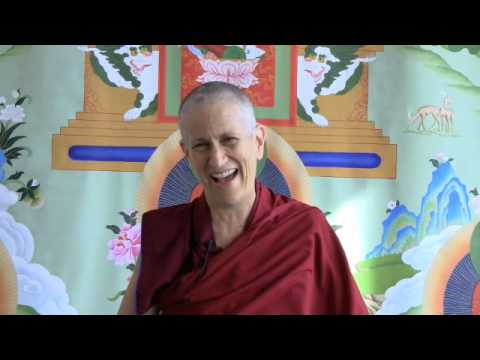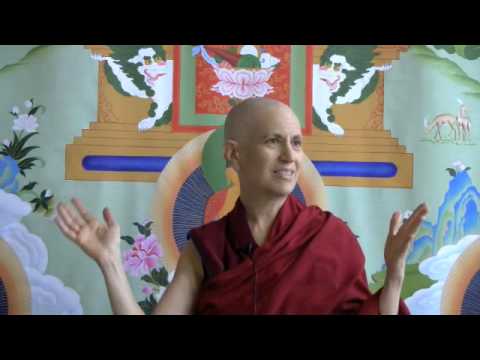Buddha nature and omniscient mind
Part of a series of Bodhisattva's Breakfast Corner talks given during the Green Tara Winter Retreat from December 2009 to March 2010.
- The difference between having buddha potential and the Buddha’s omniscient mind.
- Having buddha nature or potential does not mean we are already buddhas.
Green Tara Retreat 013: Omniscient mind of a buddha (download)
To continue the question from yesterday, for the person saying that if the analogy is of the sky and the clouds, and you remove the clouds (the clouds being the obscurations in the analogy), then the sky (representing the mind of the Buddha) is left. She was saying in this case then we’re saying that we are already buddhas.
The sky, in that analogy, does not mean the mind of the Buddha. The sky is referring to the clear light nature of the mind, which means the emptiness of inherent existence of the mind. Now our mind is empty of inherent existence, the Buddha’s mind is empty of inherent existence; they’re the same in terms of being empty of inherent existence. But the object that’s the basis of that emptiness is very different because one is our mind and the other is the Buddha’s wisdom mind. So saying that we have the clear light nature of the mind does not mean that we’re already buddhas.
Similarly, saying that we have buddha potential, the buddha nature, does not mean that we’re already buddhas. There are some people who explain it like that; that even the 32 marks and the 80 signs of the Buddha are already there in the buddha nature. Oh, they aren’t on this body! [indicating her own human body and laughing] Maybe on some subtle body, but I don’t know, I don’t see them. The way my teachers have explained it is: when that is being said it’s a way of encouraging us. It’s saying that we have the potential to become a buddha. Explaining that the buddha nature means the qualities of the Buddha are already present is a way of encouraging us to practice to become a buddha. If you use reasoning you can’t say that the qualities of the Buddha are already present—because then we would be pretty ignorant buddhas! For that reason when we talk about the buddha nature, it’s talking about the potential.
One aspect [of buddha nature] is the emptiness of inherent existence of our mind and the other aspect is the clear and knowing nature of our mind. The emptiness of inherent existence of our mind can become the emptiness of inherent existence of a buddha’s mind when our mind has been purified of all the obscurations and cultivated all the good qualities. What it is that allows us to progress along the path in that way, or what it is that transforms into the actual buddha mind, is what we call the evolutionary buddha nature. This refers to the qualities of the mind like compassion, the clear knowing nature of the mind, love, wisdom, the mental factors that we have now, that can be fully developed so they become a buddha’s mind. That’s the evolutionary buddha nature. Then you have the natural buddha nature, which is the emptiness of inherent existence of the mind.
Don’t get confused here. We’re not saying we’re already buddhas. We’re not saying when the Buddha dissolves into you that you should become a buddha at that very instant because you have the clear light nature of the mind and so does the Buddha. Why? Because the basis for those two emptinesses of the mind are very different.
Next we’ll look at the second part of your question: “Regarding the dharmakaya omniscient mind, is it dependently arisen phenomena?” Yes, because everything that exists is dependently arisen, is dependent arising. If it isn’t a dependent arising, it doesn’t exist.
“Is the Buddha’s omniscient mind permanent?” No, because if it were permanent it couldn’t change, which means it couldn’t perceive anything. It perceives everything, so it changes. It is conditioned. Regarding the wisdom aspect: the wisdom truth body of the Buddha’s mind is a conditioned phenomena. The nature body of the Buddha’s mind, which is the emptiness of true existence of the Buddha’s mind, is an unconditioned phenomenon. We talked about this some time ago and so those videos are somewhere on YouTube. But they’re there because we went through this. We talked about the four bodies of the Buddha. We need to hear these things many times because we don’t always get it at first. We don’t always get it the second, third, fourth or fifth time.
Venerable Thubten Chodron
Venerable Chodron emphasizes the practical application of Buddha’s teachings in our daily lives and is especially skilled at explaining them in ways easily understood and practiced by Westerners. She is well known for her warm, humorous, and lucid teachings. She was ordained as a Buddhist nun in 1977 by Kyabje Ling Rinpoche in Dharamsala, India, and in 1986 she received bhikshuni (full) ordination in Taiwan. Read her full bio.


